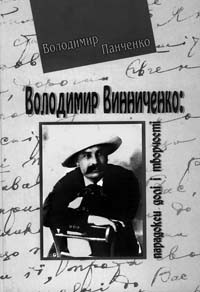It is extremely interesting and useful to study the life story of a gifted and contradictory personality, especially if this life is replete with political, psychological, and even amorous affairs. When the person in question is also a figure whose path in life coincided with the path of historical development, the study of his life story is bound to arouse both academic and general public interest.
Volodymyr Vynnychenko (1880-1951) was an outstanding Ukrainian writer, public and political figure, of whom we may rightfully say that history is reflected in his life story. The life and work of this infinitely colorful personality is still little known to the Ukrainian public. But it is crucial to know Vynnychenko as much as possible because his state-building and spiritual accomplishments, much like his miscalculations, are still relevant to this day.
Professor Volodymyr Panchenko, the distinguished Ukrainian scholar and linguist, public figure, and regular contributor to The Day, has devoted many years to the study of the life and heritage of this classic of 19th- century Ukrainian literature, who was also one of the leaders of the Ukrainian national liberation struggle of 1917-1920. The result of his research is a book entitled Volodymyr Vynnychenko: paradoksy doli i tvorchosti [Volodymyr Vynnychenko: Paradoxes of Destiny and Creativity] (Kyiv: Tvim Inter, 2004), which was launched on March 15 at the Union of Ukrainian Writers.
In his new monograph on Vynnychenko, Prof. Panchenko reveals one brilliant facet of his talent: the ability to describe things that are little known but truly important to society, and to do so in an interesting, accessible, and captivating manner with a strikingly precise selection of facts. The life of Vynnychenko is edifying to all contemporary Ukrainians in that this outstanding personality was long a hostage caught between two opposing camps: he tried to be a socialist (in 1920 he came close to being included in the leadership of the Communist Party (Bolshevik) of Ukraine) and at the same time he was a leading activist of the Ukrainian national- liberation movement. It proved virtually impossible for Vynnychenko to combine these two extremes, and this failure was his personal tragedy and a lesson to us all. It is clear, however, that his final choice was in Ukraine’s favor.
Speaking at the book launch, Yury Kochubei said that Vynnychenko’s life and work prove that Ukrainians must primarily focus on their own national interests. Didn’t all the political failures of the Directory of the Central Rada stem from the fact that all its governments were socialist and leftist? Overall, the book paints a worthy portrait of Vynnychenko as a personality who deserves to be reburied in the Ukrainian pantheon in Kyiv, if and when it is ever created. Applauding the new work by Panchenko, Mykhailo Slaboshpytsky pointed out the author’s “phenomenal fidelity” and called the book one of the most interesting Ukrainian literary works released in the past year. The Shevchenko scholar Serhiy Halchenko, Ukrainian National Academy of Sciences corresponding member Vitaliy Donchyk, the writer and poet Petro Osadchuk, and the historian Nadiya Volynets also attended the book launch and shared their impressions.
The speech of The Day’s Editor-in-Chief had everybody listening attentively. Ms. Ivshyna called on the members of the audience to ask themselves why many people are not familiar with Vynnychenko, his life story and heritage, and his epoch (the impression is that Vynnychenko was much better known in the 1920s- 1930s despite Stalin’s policies). Was it because at the time there were no modern mass media, which create not only values but also empty noise? Ms. Ivshyna also wondered at the absence of representatives from the major television channels. According to Ms. Ivshyna, Vynnychenko’s life is a graphic example of the complex interaction between Ukrainian literature and Ukrainian values, and proves that it is possible to unite these two elements and dimensions. This union will be best promoted by Volodymyr Panchenko’s book, in which history and literature have been placed on a vertical, publicistic plane. “People who will learn more about Vynnychenko may not have a decisive impact on the course of, say, the parliamentary elections, but they will know for sure which values we need. Thus, we may say with absolute certainty that the author’s achievement is that he crossed a certain “zone of estrangement” that surrounds Vynnychenko,” Ms. Ivshyna said.
Recounting how the book was conceived, Prof. Panchenko mentioned a symbolic fact. Vynnychenko kept a precious amulet in his study: a wallet with a lump of Ukrainian soil. Did the writer believe that he would one day return to his homeland? His spiritual repatriation is already in progress, proof of which is Volodymyr Panchenko’s new book.







